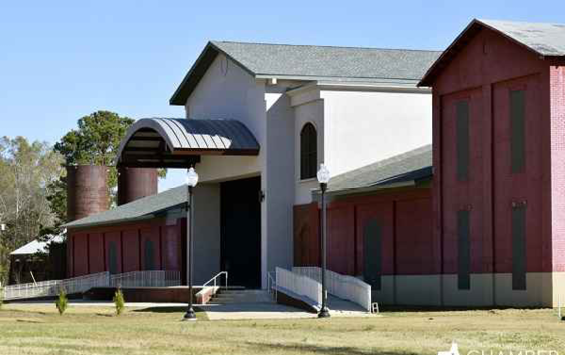
For a community of less than 18,000 people contained within 14 square miles, Selma, Alabama, has repeatedly played an outsized role in the history of the United States. Inhabited by Indigenous peoples for centuries before the arrival of Europeans, by 1865 Selma was the site of one of the Civil War’s most climactic events, when the Confederacy’s defeat in the Battle of Selma made the war’s end virtually inevitable. One hundred years later, in 1965, the city found itself again in the crosshairs of history, when the “Bloody Sunday” march across Selma’s Edmund Pettus Bridge marked an iconic turning point in the Civil Rights Movement.
But talk to the Black Belt Community Foundation’s (BBCF) Lydia Chatmon, and she’ll tell you that Selma’s future will be much more than the sum of its past. “In some ways our history has held us back,” she says. “But we’re not waiting until 2065 to change the world again.”
Chatmon is the director of Selma’s Truth, Racial Healing & Transformation program (TRHT Selma), which is a partnership between the Black Belt Community Foundation and the Selma Center for Nonviolence. This year, the BBCF and the City of Selma will present the first season of the Levitt AMP Selma Music Series at Riverfront Park and Amphitheater, bringing free, live music to the heart of this historic community, which is also beginning the recovery process from a devastating tornado that struck the city in January.
While the BBCF is involved in everything from health and nutrition resources to Head Start programs and arts and education grants across Alabama’s Black Belt, TRHT Selma focuses specifically on relationship-building and narrative-shifting within the predominantly Black, historically underserved Selma community. So when BBCF president Felicia Lucky heard about the Levitt AMP grant program, which supports nonprofits in small and mid-sized communities across the country to inject energy into underused public spaces through 10 free concerts a year, “She said, ‘This has TRHT Selma written all over it!’” Chatmon recalls.
“When you have broken relationships, you create a broken community,” Chatmon continues. “And what we want to do is help the community to heal. So when I started to do the research about the Levitt Foundation, I thought, this is great, because this will give us a chance to engage people from all walks of life, expose people to different types of music, and bring people into public spaces that have not really been utilized.”
Nestled near the banks of the Alabama River in Selma’s Riverfront Park, the Riverfront Amphitheater overlooks the Pettus Bridge, and is in walking distance of both residential areas and Selma’s downtown district. Nearby Water Avenue is home to scores of historic buildings, many of which are in the early stages of renovation and redevelopment.
Yet aside from a handful of well-attended winter holiday events and Independence Day celebrations, the Riverfront Amphitheater has been barely used since its inaugural performance in 2015. As Chatmon says: “We do know that people will come, we just need to have stuff there.”
With the Levitt AMP series offering a perfect opportunity to attract residents to the area, Chatmon hopes the Water Avenue corridor will soon become a year-round cultural and commercial hub, developed with the needs of the community in mind.
“We have developers who have come into town and are seeking the advice of the community,” she says. “Initially they weren’t, but I’m glad to say they are making far more of an effort to connect with members of the community to find out what we actually want. Developers are putting in new multi-use facilities, and upgrading some of our buildings downtown, some of which have never really been updated at all since their erection in the 1800s and early 1900s.”
Perhaps the most exciting development is one that the BBCF is spearheading itself. Immediately opposite the Riverfront Amphitheater, the organization plans to open an Innovation Center, which will offer resources and guidance for budding entrepreneurs, artists, and social media content creators from within the Selma community.
“We’re really trying to create an ecosystem down on Water Avenue, and then connecting that to the Amphitheater, where we are nurturing people’s talent—whether that’s musical talent or making coffee mugs or t-shirts,” Chatmon says. “We’re trying to create an ecosystem of families and community entrepreneurs that are able to thrive despite whatever circumstances have held them back before.”
Fortunately, Selma’s population has no shortage of talent. Chatmon hails the city’s burgeoning arts community, which includes everything from musicians to photographers and dancers. She points to famed hometown heroes like Charlie Lucas, whose metal sculptures have been exhibited everywhere from Selma to the Smithsonian, and the new Gallery 905, which provides a permanent showcase for Alabama artists and artisans. She hopes to see an expansion of the city’s annual Photographic Nights of Selma event, which hosts three days of photography exhibits, to venues up and down Water Avenue. “I’m proud to say that Selma is really kicking some doors in when it comes to performing and visual arts,” she says.
Asked what impact she hopes the Levitt AMP Selma Music Series will have, Chatmon lays out a long-term vision for community renewal.
“Success looks like having major public events in Selma at least once a month,” she says. “Like Water Avenue being filled with residents and visitors walking up and down the street, because there are things to do there. Families from all walks of life getting to know each other and dancing together and being excited to try the latest food truck. Selma getting positive press for what we’re doing, which is transforming the lives of residents, and also transforming the lives of people who are visiting us, who take what they can glean from our community back to where they’re from and start bringing more people here, so people can truly soak up what Selma is, and what it has yet to become.”
